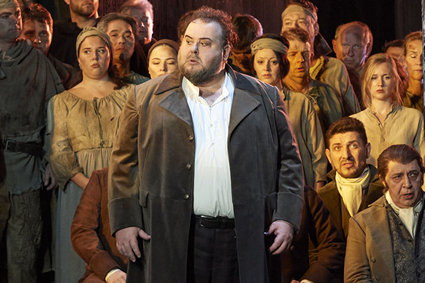| Opera Reviews | 18 April 2024 |
Fabio Sartori makes an auspicious debut as Don Carlo in Viennaby Moore Parker |
|
| Verdi: Don Carlo
Vienna State Opera 6 September 2019 |
|

Fabio Sartori (Don Carlo)
|
|
|
In a new constellation since its 2012 premiere, only René Pape and Simon Keenlyside remain from the original cast of this 4-Act version directed by Daniele Abbado - interspersed with a mélange of familiar faces, but with newcomer Fabio Sartori giving his role debut in the house as Don Carlo. A decade has passed since the Italian tenor first sang in the house (as Carlo in Donizetti’s Linda di Chamounix) and the pristine condition of his instrument today testifies to not only infallible schooling but a judicious choice in repertoire over the years (with Radames, incidentally, being his last appearance here, in 2016). Verdi’s Don Carlo brings its own singular challenge, and it was refreshing here to watch Sartori’s ease, boundless reserve, and ability to portray the character expressively through the music - if, however, somewhat hampered at times by a physique which required guarded positioning and action in his stage work. In all, though, an auspicious debut. His Elisabetta saw the return of Anja Harteros, in a passionate and touching reading - now considerably fuller in her tonal spectrum above the stave, but oddly white-timbred in her mid-register. While the former evenness in production may no longer be the rule, this compelling artist skillfully now plays with a broader palette of nuance and effect (producing some ravishing phrasing and high-lying pianissimi) - and above all, creating a flesh-and-blood character about whom one cares. Also returning to the production, Elena Zhidkova (who appears even more slender than of late and with looks to easily justify “Oh don fatale ..”), fiery in temperament, generous in tone, and bringing all the essential elements to a winning interpretation - which could, however, gain from further “Italianità” and nuance in delivery. Her Veil Song was sung with rare accuracy and aplomb (as indeed was her second set piece) - albeit with the latter being at the absolute brink of vocal reserves. Simon Keenlyside repeated his compelling Rodrigo - acted here as a rather hapless pawn, and sung with anticipated style and proficiency. The British baritone well held his own in the great Act 1 scene with Filippo, as much as in the subsequent Garden scene trio. Tastefully unsentimental - yet touching - his "Per me giunto.." was finely spun - and while crowned by a convincingly sculpted demise, it nevertheless remains impossible to oversee a certain paucity in the ideal vocal substance to consolidate the interpretation. In fine fettle, René Pape’s Filippo II has gained in dimension - both vocally and in interpretative depth to rank highly with some of his legendary predecessors in the role. Noble in pose and stature, Pape’s reading is commanding - and most effectively so in his ringing showdown with the Grand Inquisitor, as too in the contrasting heartbreak of "Ella giammai m’amò", which was wonderfully shaped and laced with imaginative colour and dynamics. Singing his first Inquisitor in the house, Dmitry Ulyanov presented a towering figure, rich in tone and convincing in play. The remaining roles were well served, and featured Margarita Gritskova’s sprightly Tebaldo, Jongmin Park’s Monk/Carlo Quinto, as well as Jinxu Xiahou’s Count of Lerma and Herald, and Diana Nurmukhametova’s debut as an accurate and bright-toned Voice from Heaven. Unfortunately the evening was plagued by uncertainty and irregularities between pit and stage (on occasions involving vocal entries, a lack of malleability, and with Jonathan Darlington generally driving throughout in tempi) - and with glaring clashes sometimes resulting. Doubly lamentable, since the essence of the reading came across as well-considered (dramatically and dynamically) and with the Vienna Opera Orchestra at times producing an interesting spectrum of balance and colour which promised an evening of greater potential than was actually realized.
|
|
| Text ©
Moore Parker Photo © Wiener Staatsoper / Michael Pöhn |
|







